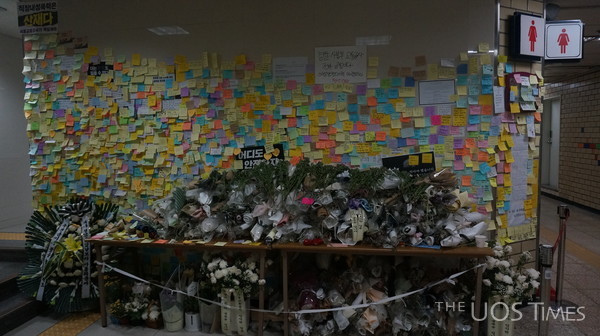The “Sindang Station homicide” is an incident that occurred on September 14, 2022. A 31-year-old man, Jeon Joo-hwan, murdered a 28-year-old female who was his former colleague in the women’s restroom at Sindang Station. Jeon repeatedly harassed the victim by texting and calling over 350 times for almost three years before committing the murder. Despite the victim having suffered from Jeon’s stalking and illegal filming, no restraining orders, arrest warrants, or assailant-focused monitoring measures were implemented. Moreover, the murder was a retaliatory offense that Jeon had thoroughly planned.
On September 15, 2022, Jeon was supposed to have been sentenced to nine years in prison. However, one day before his sentence, the victim was murdered while under no protection from the police. Jeon checked the victim's workplace and work shift by visiting other station offices and introducing himself as an employee on leave from Seoul Metro. After checking the victim’s workplace, he hid himself in the women's restroom at Sindang Station and waited for her for about an hour, holding a knife and wearing a disposable shower cap he had bought beforehand. During the police investigation, Jeon admitted to all of his crimes and the fact that he had planned to kill the victim in revenge.

On February 7, 2023, the Seoul Western District Court sentenced Jeon to 40 years in prison for the murder. He was also punished with an additional nine years of wearing an electronic tracking device for the stalking case. The prosecutor, who sought a death sentence, appealed to a higher court on February 9, 2023, and Jeon appealed for a reduced sentence the following day. On July 11, 2023, the Seoul Central District Court sentenced Jeon to life imprisonment, which was a longer sentence than in the original trial. This verdict also required 15 years of an electronic tracking device. The court deemed Jeon’s homicide a thoroughly planned retaliatory murder, which is unacceptable in terms of justice. The Supreme Court dismissed Jeon’s second appeal and upheld the appellate court’s decision to sentence him to life imprisonment.
Though a year has passed since the Sindang Station murder, the threat of stalking remains in South Korea. According to data from the Supreme Prosecutor’s Office, Republic of Korea (SPO), 29,156 cases of stalking were reported in 2022. Among them, 7,141 stalking suspects were apprehended. However, arrest warrants were filed against only 254 individuals. This indicates that only 3.6 percent were actually separated from their victims. Due to the severity of the situation, the National Assembly enacted the “Act on Prevention of Stalking and Protection of Victims” in January. Unlike the “Stalking Punishment Act,” the new act has preventive treatment of providing temporary housing and recovery programs for victims. It also prevents secondary offenses in the workplace by prohibiting measures that adversely affect the victim’s identity and reputation. As the new act shows, South Korea is evolving but still faces the challenge of stalking crimes. To prevent further victimization, society needs additional change. The UOS Times wishes for no more victims to suffer from stalking crimes in a safer society.

